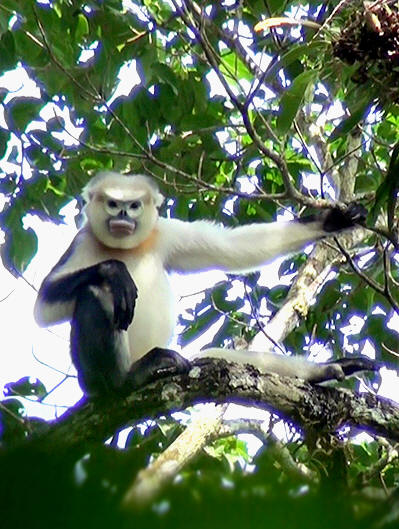 |
Order : PRIMATES
Family : Cercopithecidae
Species : Rhinopithecus avunculus
Head-body length : 51-62 cm
Tail length : 66-92 cm
Weight : males 14 kg, females 8.5 kg
The Tonkin Snub-nosed
Monkey, or Dollman's Snub-nosed Monkey, is one of just two species of the genus Rhinopithecus
occurring in Southeast Asia, the
other being the Myanmar Snub-nosed Monkey (Rhinopithecus strykeri).
There are three other species of the genus in China.
This is one of the rarest and most endangered primates in the world, with a
population estimate of less than 250 individuals, and numbers may still be
declining due to habitat loss and hunting. They are highly vulnerable to
being shot by poachers as they are reportedly not shy of humans.
The species inhabits primary, evergreen forest in areas of karst limestone up to 1200
metres elevation. It is largely arboreal, only rarely coming to ground. It feeds on young leaves, forest fruits and seeds.
Its fur colour and patterning is unmistakable, being immaculate white on the
face, chest and inside the arms and legs, and black elsewhere. It has
pronounced eye-rings tinged with blue, and orange fur beneath the chin
(which may be more pronounced in males). Its tail is long and is typically
dark on top and pale beneath. Infants are grey and white, and lack an orange
throat patch.
Its facial features are also unmistakable - its lips are thick and bright
pink, and the nose is flat and upturned. The ears are tufted.
Males weigh up to 14 kg, and females are considerably smaller at 8.5 kg.
The species only occurs in Vietnam, and is confined to a few fragmented
forests in the northern provinces of that country. IUCN (Quyet et al, 2020)
list the species as occurring in two protected areas in Vietnam - the Na
Hang and Cham Chu nature reserves.
Fig 1 : An adult male takes a curious look at the photographer while resting
high on a branch.
Fig 2 : The male is accompanied by a female, which is around 40% smaller than the male.
Fig 3 : The male surveys his surroundings, thereby revealing the
bright orange fur beneath the throat.
All photos
extracted from a video filmed by Andie Ang in
Ha Giang Province, Vietnam. The monkeys were sighted late morning, at an
elevation of 880 metres.
References :
Francis, C.M. 2019. A Field Guide to the Mammals of South-east Asia.
Second Edition. New Holland. 416 pp.
Quyet, L.K., Rawson, B.M., Duc, H., Nadler, T., Covert, H. & Ang, A.
2020. Rhinopithecus avunculus. The IUCN Red List of Threatened
Species 2020: e.T19594A17944213.
|